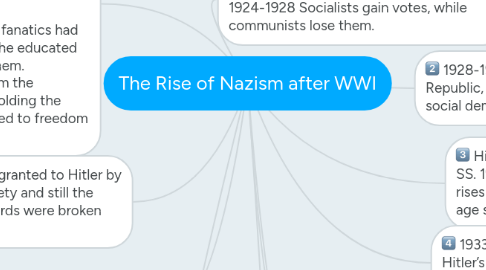The Rise of Nazism after WWI
por moni velasco

1. Doctrines of racism was adopted by potencies like USA, France, Great B, etc. No party was able to form a government or enjoy the majority in the Parliament “ The Nazis were winning adherents wherever there was distress.”
2. Poor favoritism to parliamentary system of government (communists weak). 1924-1928 Socialists gain votes, while communists lose them.
3. He raises value and memberships to the Nazi party.
3.1. Nazis → arrogant nationalistic and race ideas, semitic doctrines,
3.1.1. NATIONALISM Racism, Burning books
3.1.2. SOCIAL Jews were besmirched by Nazi calumnies that they were war profiteers and corrupters.
4. Hitler's Policies: Totalitarian Regime
4.1. Neutralised all political opposition.
4.2. Attack on minorities (problematic groups)
4.3. National Ideology revolution (trust of the authorities and hope for better times)
4.4. Army and Foreign Ministry under Nazi control.
4.5. Manipulation of press and radio --> Nazi re-election secured.
4.5.1. Enabling Law
4.6. GESTAPO
4.6.1. Gleischaltung
5. Concessions were granted to Hitler by the International Society and still the Versailles Treaty Accords were broken by Germany in 1936.
6. CONCLUSION By 1934 Hitler's regime had established a sufficient base of power and secured enough willing cooperation of 'experts' in: the administration business Industry, the army, for his Nazi The Nazi ideologues and fanatics had formed an alliance with the educated and skilled who served them. Hitler, in 1936, handed him the spectacular triumph of holding the Olympic Games, dedicated to freedom and democracy, in Berlín.
7. 1928-1939 Decline of the Weimar Republic, and it is blamed upon the social democrats.
7.1. Wall Street Crash: chain reaction in Europe.
7.2. Nazis: 1928 → 810 000 1930 → 6.5 million
8. Versailles Treaty → Unsatisfied Germany increases nationalism.
9. Hindenburg: Unemployment, ban of SA, SS. 1932 (deep in crisis), re-elected, Hitler rises against him and loses, but his old age secured him a future.
9.1. France von Papen assumes power but is greatly disliked, so by 1933 Hitler is in power.
10. 1933 Hitler as chancellor of Germany Hitler’s Reich was characterized as steeps back to barbarism
11. ECONOMY the destructive behaviour of the political parties during the economic crisis of 1929 to 1930 had created a crisis of government
11.1. Blame the Treaty of Versailles for the economic situation Taxes reduced Industries’ contributions began flowing to Nazi’s funds. Weimar was guilted for the economic losses.
11.2. March 1933: begins paln to stimulate economy out of recession (unemployment issue), minorities and women out of the work place,



